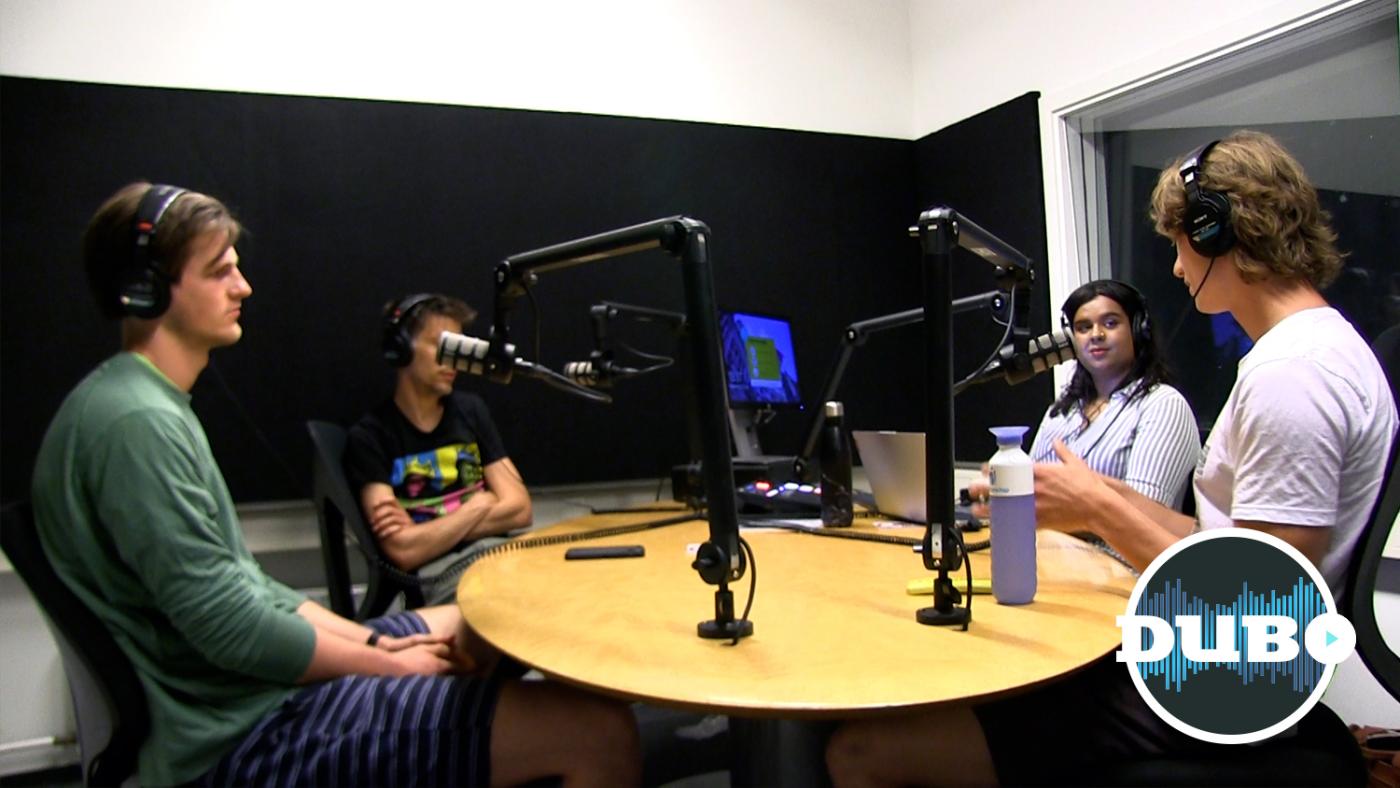DUB's student podcast discusses addiction to mobile phones
‘Dare to be by yourself for a change’

A couple of years ago, student Oetse found out he was spending way more time on his phone than he would like. "I noticed that I was constantly picking up my phone to distract myself. That's when I decided that things had to change. I bought an old Nokia with which you can't do much besides texting and sending WhatsApp messages. It's not a smartphone. That way, I forced myself to be with myself more often and reflect more."
That's an unusual way to go about things, considering almost everyone on public transport is looking at their phones these days. Oetse: “It feels so good to look out the window and think about stuff. It's also fun to look around and see what everybody is up to."
Sheetal Ramdas, a fifth-year student of Artificial Intelligence, can relate. "I spend an average of six hours a day on my phone, sometimes up to ten hours during exam season. I wonder where all that time comes from. And, whenever I try to cut it back, I find that it's not that easy. Am I addicted?" That's why she wanted to make this podcast episode.
Lou Boshart, a student of Liberal Arts & Sciences, co-hosts the episode. Sheetal and Lou are joined by Oetse Donner, a Master's student in Applied Ethics, and Professor Stefan van der Stigchel, whose research focuses on attention. He is the author of the books How attention works and Concentration.
Screen time is not everything
Van der Stigchel immediately comments on measuring how much attention you give to your mobile phone through screen time. "It's more about what you're doing on that screen. I recently cancelled my subscription to a print newspaper, which has increased my screen time by 45 minutes. Is that bad, though? It's more annoying when you spend that entire time on social media."
He refrains from qualifying frequent mobile phone use as an addiction. "Experts speak of addiction when a person gets physical problems because they no longer get a particular substance. They start shaking or vibrating. This could be caused by drugs but caffeine deprivation can have that effect as well. When it comes to your phone, your body is not short of anything. That's why I would rather speak of a solid habit. We develop automatisms that we don't easily get rid of. We get so used to them. You could call that an involuntary habit, a reflex. To get rid of them, you must make a real effort and it takes time. But you usually do succeed in the end. Other addictions, such as alcohol or drugs, are much harder to shake off."
Are you missing out if you don't have a smartphone?
Lou says that he once heard a teacher say that addiction is when something takes over your life and becomes more important than your primary needs. Think of gaming or gambling, for example. "If you describe addiction like that, then overly using your phone does fit the definition," says Van der Stigchel. "I just think you have to be careful not to lump all forms of addiction together as some addictions are harder to get rid of than others."
Oetse adds that it was hard not having a smartphone at first. "Every time I was at the bus stop, I would automatically grab my phone even though I couldn't do anything with it. It was such a persistent habit." The fact that he didn't have a modern phone also took some getting used to for his friends and family. Some of his friends even got angry at him because they couldn't send a Tikkie or a link to buy tickets to a concert. "I did end up buying a tablet just to be able to participate in that sort of thing. I couldn't log in to the university system, for example."
Sheetal would not switch her smartphone for a simple phone because she would be afraid of missing out on important things. Oetse: "It is true that you are less informed about what your friends are up to when they live in other cities, like Rotterdam or Groningen. But, in the end, that doesn't matter when you meet them again. It's not the important things you're missing out on."
The dopamine fable
Why are we glued to our mobile phones like this? Van der Stigchel has an idea. "The brain loves new information. And the phone provides exactly the information you want to know about. That's how algorithms work. When I open social media, I see exactly what I want to see. That is how they collect my data. My phone knows before I do that I want new shoes. Besides, if you post something on social media, you want to check out how people react to it."
It is often said that social media is addictive because it induced dopamine production in our brains. Van der Stigchel relegates this to the realm of fables. "People say there a shot of dopamine supposedly induces a feeling of happiness. If only the brain was that simple. The truth is that dopamine is a neurotransmitter, like many others, and we scientists don't know exactly how it works."
People don't want to be alone
There is, however, another reason why we recur to our mobile phones so much: many humans don't like to be alone with their own thoughts. "There was a study in which a test subject was alone in a room with a device that allowed them to give themselves a shock. It took the subjects an average of twelve minutes to do it. They prefer a shock to being alone in a room with their own thoughts. No wonder they say a wandering mind is an unhappy mind."
To Van der Stigchel, that's a bad trait as we need to take time to daydream. Our minds cannot be focused on things all the time. By means of example, he says that, when we read a book, sometimes our mind wanders and we cannot absorb the content. "We are looking for a balance between working concentratedly and giving the mind free rein. Both things are necessary. You shouldn't suppress that but rather nurture it."
Oetse can relate. "Now that I am much less on my phone, I have more time to think about things. It gives me time to think about what I want to do that day and prepare for it." To which Sheetal adds: "You also see more things when you don't have your phone with you. I was on the bus the other day and I ran out of batteries. I looked outside and saw a man falling in the street. No one saw that but me. I couldn't share it either." Sheetal is not a fan of daydreaming. "It's boring and tedious. I get impatient pretty quickly."
An opportunity for self-reflection
"But it is good for your concentration and creativity. People often say that we get the best ideas in the shower or on a bike," observes Van der Stigchel. "But it has yet another function. If you let your thoughts run wild, thoughts about things you are struggling with can also surface. Perhaps they are things you'd rather not think about, but they matter to you. That's what we call a signal function. I experienced that myself when thinking about a friendship that was otherwise totally fine. Once you have those thoughts, you have to do something about them. It is an opportunity for self-reflection."
There is another mobile-free alternative for those who dislike being confronted with themselves. They can give themselves an assignment, such as counting how many different types of trees there are on the way or how many birds they see. When we choose a different setting, we start looking at the environment from another point of view. Van der Stigchel has a great example: "The municipality of Utrecht has an app about art in public spaces. It makes you walk through the city looking at it with different eyes. You see details in the artworks that you hadn't noticed before, and the signs next to them. Granted, it is an app."
Tips to cut out excessive phone use
Students can get quite attached to their phones. Although Van der Stigchel prefers to call it an involuntary habit rather than an addiction, there are some tricks you can use to help your brain distance itself from the phone. Oetse: "I once made a list of things that matter to me and another list of how I spend my time. I realised that I was actually spending a lot of time on my phone, even though that was not high on my priority list at all. This made me more aware of what I was doing. Another tip is to have a no-Wifi Sunday or even a no-Wifi weekend every now and then. That can help as well."
Van der Stigchel adds that it is crucial to break the unconscious. "You can be critical regarding the apps you download. Do these apps relate to what matters to me? I would also recommend working with two screens and having fewer apps on your screen when you travel. Turning off notifications helps a great deal, too. The more actions you have to perform, the more aware you are of what you are doing." Lou says he is happy with his mobile phone as it makes his life a lot more pleasant. But he does want to be critical of the way he uses it. "By turning off notifications, for example."

This is the second episode of DUB's Student Podcast, which is hosted by four UU students selected by our editors. The first episode was about ChatGPT. If you speak Dutch, you can listen to it here. Otherwise, you can read a summary of their conversation here. Up next: dealing with ADHD as a girl and the normalisation of drugs among students. This podcast is financed by the National Education Programme.